- Home
- William Gibson
All Tomorrow's Parties bt-3 Page 24
All Tomorrow's Parties bt-3 Read online
Page 24
All guns exist to be fired, he knows, and Rydell has proven this by firing Martial's, that ugly thing, Russian, vicious booty out of the Kombinat states by way of Africa, out of wars of an abiding stupidity, ethnic struggles smoldering on for centuries, like airless fires down in the heart of a dry bog. A gun for those unable to be trained to shoot.
Reek of its propellant charge in the hack of his throat, harsh and chemical. A frosting of shattered glass beneath his shoes.
Rydell stands at the door, the ungainly chain gun dangling from his hand like a duelist's pistol, and now Fontaine stands beside him, looking out into the bridge's narrow covered thoroughfare as into a tableau or diorama, and opposite, there, all glitters with red. Though surely in the shadows one would find more solid, substantial evidence, bone and gristle perhaps, and that automatic gun.
'Chevette, Rydell says, not to her but as if reminding himself of her, and turns, crunching back through the glass, to find her.
Fontaine blinks at the queer red glitter over there, the smear that someone has so instantly become, and catches something moving, high up in the periphery of vision. Silver.
Flinches, but it's a balloon, a cushiony oblate of inflated Mylar, with, it looks like, little caged articulated props and a camera. This draws even with the front of his shop, halts itself with reversing props, then neatly rotates, so that the lens looks down at him.
Fontaine looks up at the thing, wondering if it has the wherewithal to hurt him, but it simply hangs there, staring, so he turns and surveys the damage to his shop. All this glass is the most evident breakage, bullet holes themselves being not so visible. Two of them, though, have punched through a round enamel Coke sign that previously would've rated an eighty percent, but now is scarcely 'very good.
It is the counter that draws him, though he dreads what he will find: his watches there beneath shards of glass, like fish in a shattered aquarium. Plucking up a Gruen 'Curvex' by its faux-alligator band, he finds it not to be ticking. He sighs. Clarisse has been after him for some time now, to buy a fire safe in which to place his more valuable stock at night. Had he done so, the watches would still be ticking. But this one is, the Doxa chrono with the gently corroded dial, a favorite of his which customers pass over repeatedly. He holds it to his ear, hearing the sound of a mechanism assembled years before his own birth.
But here he sees something which will make Clarisse more unhappy still: her Another One babies lie tumbled in a heap, like some tabloid photo from a nameless atrocity, their ruptured heads and torsos oozing silicone (which is either a liquid that behaves like a solid or vice versa, Fontaine can never remember which). Not one of them has survived intact, and as he bends for a closer look he hears one repeating, endlessly, an apparent single syllable, though whether in Japanese or English he cannot tell. This briefly and deeply fascinates him, and he remembers a similar feeling, as a child, when he viewed through a police line the rubble of a movie theater in Harlem; the fire that had gutted the place had stopped short of the candy counter, but everything in that counter had melted, had poured out and solidified into a frozen stream of refined sugar, smelling much better, even over the sourness of damp ashes, than this silicone does.
And hears Chevette and Rydell talking, arguing it seems, and he wishes they would stop.
He is in the eye, and he wishes simply to know it.
58. SMALL BLUE ABSENCE
THE close-up, hand-held, shows Laney this small blue absence just in from the corner of the dead man's eye, like some radical experiment with mascara. A bullet hole, entry wound, of the most modest circumference.
'You'll note the lack of powder burns, says the one holding the camera. 'Done from a distance.
'Why are you showing me this? Harwood asks, once more the disembodied voice.
The frame pulls back, revealing the dead man, blonde in a black leather jacket, reclining against some vertical surface fogged with whorls of aerosol enamel. He looks surprised and slightly cross-eyed. Pulls back farther, revealing a second body, this one in a black armored vest, facedown on worn pavement.
'One shot each. We weren't expecting him to have a gun.
'The bridge isn't noted for adherence to firearms regulations, you know.
The man with the camera reverses it, his face appearing from an odd angle, shot from the level of his waist. 'I just wanted to tell you 'I told you so.
'If he leaves the vicinity alive, your firm will find itself in more than contractual difficulties. You signed on to take care of anything, remember?
'And you agreed to listen to our suggestions.
'I listened.
'I came out here with a five-man team. Now two of them are dead, I've lost radio contact with the other three, and I've just heard what sounded like an explosion. This environment is inherently unstable: an armed anthill. These people have short fuses and no coordinating authority. We could have a riot on our hands, and once that happens, we'll have no hope at all of taking out your man, or of capturing Rydell.
'Recapturing Rydell, you should say.
'I have one last suggestion. The man raises the camera slightly, so that his face fills the screen, his black scarf blanking the bottom third of the image.
'Yes?
'Burn it.
'Burn what?
'The bridge. It's a tinderbox.
'But wouldn't that take time to arrange?
'It's already arranged. The man shows the camera a small rectangle, a remote, that he holds in his other hand. 'We've been planting radio-activated incendiaries. We like to cover the options.
'But aren't our two men likely to escape in the ensuing confusion? You tell me you're afraid of a riot, after all.
'Nobody's getting off this thing. It'll burn from both ends, from Bryant Street to Treasure Island.
'And how are you getting off yourself?
'That's been taken care of.
Harwood falls silent. 'Well, he says, at last, 'I suppose you should.
The man thumbs a button on the remote.
Laney flicks away from the lozenge, panicking, looking for Libia and Paco.
The projector is still here, still on the bridge. He still doesn't know what part it plays, but Rei Toei must have a presence in the impending cusp.
And he sees that Harwood knows that, or feels it, and is moving, has moved, to prevent it.
He pulls the eyephones from his head and gropes through the colors of darkness, searching for a phone.
59. THE BIRDS ARE ON FIRE
CHEVETTE kept looking at the holes in the plywood partition between the front and the back of Fontaine's shop, noticing how the bullets had taken out long splinters of plywood on each side of the actual holes; extending lines, in her mind, through those holes and on back through the room.
She couldn't figure how she'd missed catching one. What it had done, though, was give her the shakes; she kept shivering, and if she didn't keep her teeth together they'd actually chatter, and she had hiccups as well, and both these things embarrassed her, so she was taking it out on Rydell and feeling sorry for him at the same time, because he looked like he was in his own kind of shock.
She was vaguely aware of people coming up to the door of the shop and looking in, but then they'd see Rydell with the chain gun and go away, fast. These were bridge people, and this was how they reacted to something like this. If they hadn't seen an armed man there, they'd have asked if everyone was okay and could they help, but otherwise it was about taking care, as Skinner had liked to put it, of your own side of the street.
She felt like she'd split in half, the part of her that was ragging Rydell for getting her into this kind of crazy shit again, and the part of her that just kept looking around and wanting to say: look at this, and how come I'm alive?
But something started beeping, in Rydell's pocket, and he took out a pair of sunglasses, black frames with cheap chrome trim, and put them on. 'Hello? he said. 'Laney?
She looked over as the one who'd talked Fontaine out of his gun
opened the door, glass grating beneath it, and stepped in, looking exactly the same as when he'd left, except he had a long fresh scratch down the side of his face, where blood was beading. He took the skinny little revolver out of his pocket and handed it to Fontaine, holding it sideways with his hand around the thing you put the bullets in. 'Thank you, he said.
Fontaine brought the gun up beneath his nose, sniffed at it, and raised his eyebrows questioningly.
'I've adjusted the windage, the man said, whatever that meant. 'No need now to compensate for the pull.
Fontaine clicked the bullet-thing out and ejected five empty brass cartridges into his palm. He looked at these, looked up at the man. 'How'd you do?
'Three, the man said.
'I think they've got one, Rydell was saying. 'There's this kid here on it. You want me to try the cable? You talk to her, Laney? She told me you used to talk with her a lot… Rydell looked idiotic, standing there talking to the guy in front of him, one hand up to hold the ear bead in, the other letting that crazy-ass gun hang down. She wished he'd put it somewhere, back in the wall, anywhere.
'Come on, Rydell, she said, but then she saw that God's Little Toy was up against the ceiling in the front of the shop, watching her. 'Tessa? Tessa, you hear me?
There was a burst of squawky static, like a parrot trying to talk.
'Tessa?
'I'm sorry, the man in the long coat said. 'The men who attacked you communicate on a number of specific channels. I am employing a jammer at those frequencies. He looked at God's Little Toy. 'This device's control frequencies are unaffected, but voice communication is currently impossible.
'Tessa! Chevette waved frantically at the balloon, but it only continued to stare at her with its primary lens.
'What do you mean, burn it? she heard Rydell say. 'Now? Right now? Rydell pulled the sunglasses off. 'They're setting fire to the bridge.
'Fire? She remembered Skinner's caution around that, how careful people were with cooking gas, matches; how a lit butt thrown down could earn you a broken nose.
But Rydell had the sunglasses on again. 'I thought you said to get out? What do you mean, leave her? Damn, Laney, why don't you make some sense for once? Why-Laney? Hey? She saw Rydell's tension as he took off the glasses. 'Listen up. Everybody. We're leaving now. Laney says they're setting fire to the bridge. Rydell bent, wincing, and opened his bag, hauling this silver thing out. She saw it glint in the light from outside. Like a big steel thermos. He pulled out some coiled cables and tossed her a length. 'Find a socket. He had another cable in his hand now and was standing over the boy with the old military eye-phone rig. 'Hey. Kid? We have to borrow the notebook. Hear me? The helmet came up and seemed to regard him blindly but sentiently, like the head of a giant termite. Rydell reached down and took the notebook, unhooking the lead to the helmet. Chevette saw the boy's mouth close. The notebook's screen showed the black dial of a clock. No, Chevette saw, it was an old-fashioned watch, enlarged to the size of a baby's face.
Rydell studied the two ends of the cable he held, then tried a socket on the back of the notebook. Another. It fit. Chevette had found an outlet, set crookedly into one of Fontaine's walls. She plugged the cable in and passed Rydell the other end. He was plugging the cable from the notebook into the silver canister. He plugged the power cable in beside it. She thought she heard it start to hum.
And a girl was there, pale and slim, glowing with her own light, naked for an instant between them. And then she wore Skinner's jacket, faded horsehide. Black jeans, a black sweatshirt, lug-soled runners. Everything cleaner and somehow sharper than what Chevette wore, but otherwise identical.
'I am Rei Toei, the girl said. 'Berry Rydell, you must leave the bridge now. It is burning.
'You said that you knew my name, the man in the overcoat said, the long thin scratch on his face black in the light she gave off. 'In the tavern.
'Konrad, the glowing girl said, 'with a 'K.
The man's eyebrows rose, above his round gold glasses. 'And how do you know that?
'I know many things, Konrad, the girl said, and as she said it, became, for a few seconds, another girl, blonde, the irises of her blue eyes ringed with black.
The man seemed carved from some incredibly dense wood, heavy and inert, and Chevette thought for some reason of dust motes floating in sunlight in an old museum, something she'd seen once but could not remember where or when. 'Lise, he said, a name as if dredged from some deep place of pain. 'Yesterday. I dreamed I saw her, in Market Street.
'Many things are possible, Konrad.
Rydell had taken a pink fanny pack from his duffel and was strapping it around his waist. It had a grinning cartoon dragon screened on the front. As Chevette watched, he zipped it open and unfolded a pink bib, which he fastened around his neck. The bib said LUCKY DRAGON SECURITY in square black letters. 'What's that? Chevette asked him.
'Bulletproof, Rydell said. He turned to the glowing girl. 'Laney says I should leave the projector here. But that means we leave you-
'That is what I want, she said. 'We are about to find our way to the heart of Harwood's plan. And change it. And change everything. She smiled at Rydell then, and Chevette felt a twist of jealousy.
Chevette became aware of noise approaching, the revving and whining of overtaxed electric engines. There was a crashing of metal on wood, and Fontaine sprang away from the door. A three-wheeled ATV slammed to a halt outside, Tessa straddling its seat behind a moon-faced boy who wore a black meshbacked cap, backward, and a black T-shirt. Tessa was wearing her input glasses and had a control glove on either hand. She pulled off the glasses and pushed hair back from her eyes. 'Come on, Chevette.
'Get off the damn trike, honey, the round-faced boy said. 'Don't have a lot of turning radius in here.
Tessa hopped off the bike and stepped into the shop, looking up at God's Little Toy. 'I'm not getting any audio, she said.
The boy punched the engines mounted in the ATV's rear hubs, reversing one. The trike lurched around and back, then forward, turning so that he faced back toward San Francisco. 'Come on, honey, he said.
'I'm picking up flames on two cameras, Tessa said. 'This sucker's on fire.
'Time to go, Rydell said, putting his hand on Chevette's shoulder. 'Mr. Fontaine, you get you a ride here with Chevette.
'I'm not going anywhere, son, Fontaine said.
'It's on fire, Mr. Fontaine.
'It's where I live.
'Come on, Rydell, Chevette said, grabbing him by his waistband.
Tessa had climbed back on, behind her meshbacked driver, and was putting her input glasses on. 'Jesus, Tessa said, 'I don't believe the angles I'm getting.
Chevette tugged Rydell through the door and climbed on the back of the ATV, sort of sidesaddle, leaving room for Rydell. 'Wait, Rydell said, 'we can't just leave them here.
'We'? Hey, boy, I'm not carrying you- But the moon-faced boy saw the chain gun then and stopped.
'Go on, said Fontaine, who stood now with his arm around the shoulder of the boy who'd worn the helmet, whose eyes regarded Rydell with a sort of animal calm. 'Go on. We'll be okay here.
'I'm sorry, Rydell said. 'I'm sorry about your shop.
'Your ass be sorry, you don't get out of here.
Chevette heard a woman start screaming, toward San Francisco. She yanked his waistband, hard. The fly button popped off his khakis. He climbed on the back of the ATV opposite her, hanging on with one hand, the chain gun in the other.
The last she saw of the glowing girl, she was saying something to the man she'd called Konrad. Then Tessa's meshback popped it and they took off toward the city. 'Good-bye, Fontaine, Chevette shouted, but she doubted he ever heard her.
Remembering the night of a hill fire above the sharehouse, the birds in the brush all around the house waking in the dark, sensing it. All their voices.
And now through the plywood patchwork overhead she hears it too: the drumming of conflagration.
60. RATS KNOW
FONTAINE knows the bridge is burning when he looks out and sees a rat streak past, toward Oakland. Then another, and a third. Rats know, and the bridge rats are held to be most knowing of all, through having been hunted so thoroughly by the bridge's host of feral cats and by innumerable equally feral children armed with slingshots cobbled from aircraft aluminum and surgical tubing. These bridge slingshots are lethal not only to rats, their users favoring balls of dense damp clay, a trick held over from the Middle Ages and not to be underestimated.
Fontaine watches the rats flash past and sighs. He has a fire ax here, somewhere, salvage from a tug sank in China Basin in 2003, and an extinguisher too, but he can't imagine these will be of much use, although chopping a hole in the back wall and falling into the bay is a possibility. He wonders if there actually are sharks there, as the bridge children like to believe. He knows for a fact there are mutant fish, warped, it is said, by oxides leaching off the piers of the cable towers.
But Fontaine has survived many disasters, both municipal and marital, and there is in him that which believes, against all odds or hope, that all will simply, somehow, be well. Or that in any case there is usually not much to be done about certain things, or in any case not by him.
So, now, rather than digging through the closet, where he remembers, possibly, putting that fire ax, he picks up his push broom and begins tidying the front of the shop, sweeping as much of the glass as possible into a single drift beside the door. Glass, he reflects, sweeping, is one of those substances that takes up relatively little space until you break it. But it is also, he recalls being told, if considered over truly cosmic stretches of time, a liquid. All the glass in every pane in every window, everywhere, is in the infinitely slow process of melting, sagging, sliding down, except it would be unlikely that any one pane survive the millennia required to be reduced to a solid puddle.
While outside the rats are being joined by fleeing humans, as diverse a company of them as only the bridge can offer. He hopes that Clarisse and the children are safe; he's tried to phone, but no answer, and there seemed little point in leaving a message, under the circumstances.

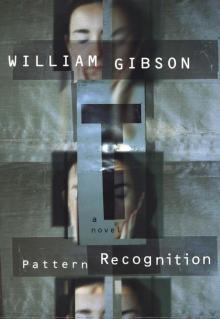 Pattern Recognition
Pattern Recognition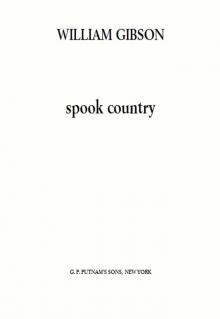 Spook Country
Spook Country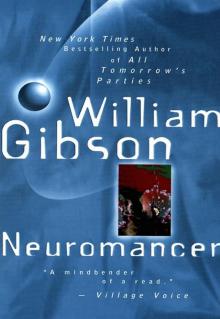 Neuromancer
Neuromancer Skinner's Room
Skinner's Room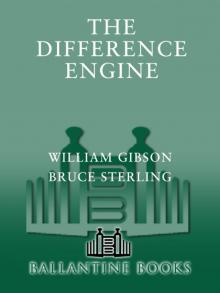 The Difference Engine
The Difference Engine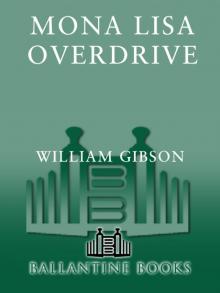 Mona Lisa Overdrive
Mona Lisa Overdrive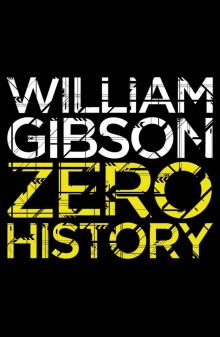 Zero History
Zero History The Peripheral
The Peripheral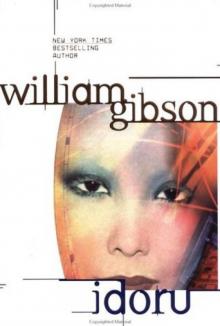 Idoru
Idoru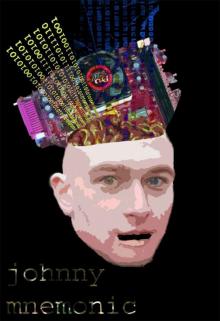 Johnny Mnemonic
Johnny Mnemonic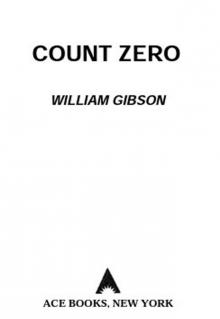 Count Zero
Count Zero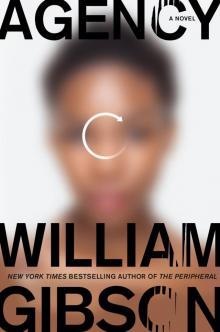 Agency
Agency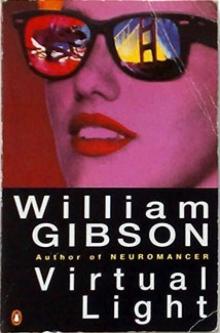 Virtual Light
Virtual Light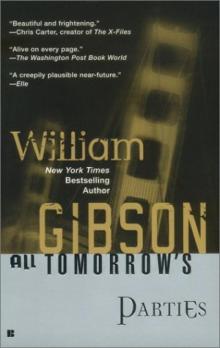 All Tomorrow's Parties
All Tomorrow's Parties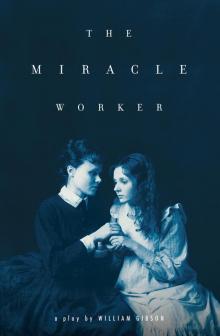 The Miracle Worker
The Miracle Worker Disneyland with the Death Penalty
Disneyland with the Death Penalty Idoru tb-2
Idoru tb-2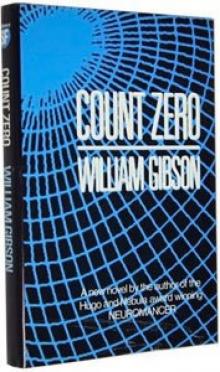 Count Zero s-2
Count Zero s-2 The Gernsback Continuum
The Gernsback Continuum New Rose hotel (tales)
New Rose hotel (tales)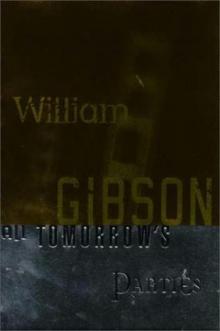 All Tomorrow's Parties bt-3
All Tomorrow's Parties bt-3 Hinterlands
Hinterlands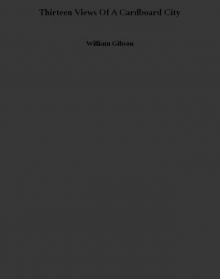 Thirteen Views Of A Cardboard City
Thirteen Views Of A Cardboard City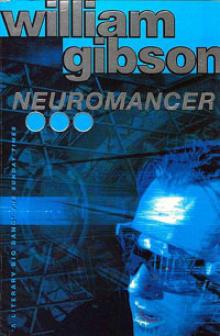 Neuromancer ts-1
Neuromancer ts-1 Virtual light b-1
Virtual light b-1